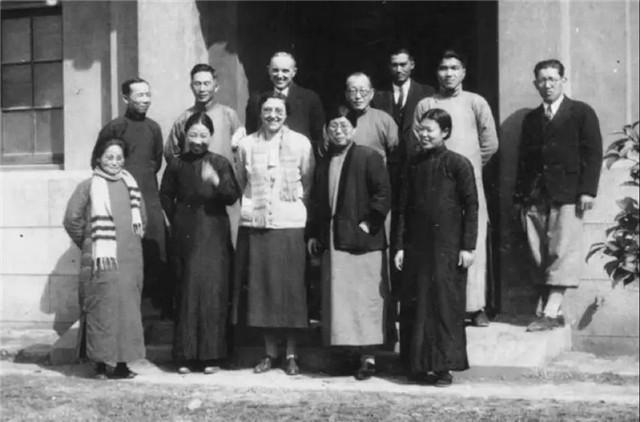Megan Brady Sang the Song Mercy as a Call for Peace as the Younger Generation
At this year's candlelit vigil on the national memorial ceremony for the victims of Nanjing Massacre, Megan Brady, a 17-year-old Canadian girl, moved a lot of people with the song Mercy that she wrote.
Megan is the great granddaughter of Richard Brady, a surgeon of the Drum Tower Hospital during the Nanjing Massacre. In December 1937, Richard Brady sent his wife and daughter to Hong Kong but was prevented by the Japanese from returning to Nanjing. It was not until in February 1938 that he got back to the Drum Tower Hospital to help with Dr. Robert Wilson in their efforts to shelter and rescue the innocent Chinese people.
Like all the international friends that came to the aid of their Chinese compatriots, Richard Brady did not share too many memories of the war with his children. Stephen Brady, Megan's father, learned about his grandfather only as he grew older. In 2007, Stephen took the then five-year-old Megan to Nanjing to follow in his grandfather's footsteps.
Stephen thought he had come to the wrong place the first time he set foot in the Drum Tower Hospital. But when he saw his grandfather's name on the physician's registry for the hospital, Stephan said he felt a sense of home.
However, Megan was too young to understand the severity of the Nanjing Massacre and the importance of the work of the Nanking Safety Zone. Years later, Megan came back to Nanjing for the memorial ceremony. She was deeply touched by the work of Minnie Vautrin.

Front row, third from the left, Minnie Vautrin
Minnie Vautrin grew up in Illinois and came to China in 1912. During the Nanjing massacre, Ginling College for Women (Jinling Nvzi Xueyuan) became a refugee center for women and children, and Vautrin was one of its founders. She often stood up to protect Chinese women from Japanese soldiers. In the diary of Mr. Rabe, Ms. Vautrin was described in vivid terms, and it says that she protected them like an old hen with her chicks.
Standing in front of a statue of Minnie Vautrin, Meghan was moved that she wrote the lyrics of Mercy soon after. "I seemed to see the faces of the people inside the college – those children and women. This song is my humble attempt to convey their emotions and feelings at the time," Megan said.
Mercy
Lyrics: Megan Brady
Composer: Li Si-han
Lonely nights
Clouded and grey
Time goes by
You begin to fade
Lost inside
Fallen afraid
Take my hand
Hope will lead the way
I'll reach for you
I long to know the truth
and I will feel for you
imagine all you went through
Can't heal your wounds
scarred broken and blue
But I'll honour you,
your heart that's pure and true
Love douse the fires
Peace come with the rain
Rise from the ashes
Harness all the pain
Behind the closed doors
on the stone cold floors
All cries for help,
they echo off the walls
I'll reach for you
I long to know the truth
and I will feel for you
imagine all you went through
Can't heal your wounds
scarred broken and blue
But I'll honour you
your heart that's pure and true
Even when your hope is fading
Weren't sure that you would make it
The road you're on is one worth taking
Just carry on and on
and you will reach the light
Lonely nights
Clouded and grey
Time goes by
You begin to fade
In the interview, Megan said that she was shocked at how little the awareness outside of China is around the Nanjing Massacre. She wished to share this piece of history with the young generation across the world through her music.
Li Sihan, composer of Mercy, said that he has grown up in Nanjing and got used to the howling sirens when the massacre victims are remembered each year. Her lyrics of the song is very sincere and he felt the Mercy in it as well.
According to Jiang Chaonan, more and more descendants of these foreign heroes took their children to the ceremony in recent years, passing on the spirit of peace.
On December 14, Meghan and her father visited the Memorial Hall. She said she wanted to sing Mercy in front of the statue of Minnie Vautrin and dedicate it to her great grandfather, to Minnie Vautrin and to Nanjing.
Megan's singing soon drew a lot of visitors. Although not everyone could understand what she was singing, the idea of peace was spread.
In December 1937, expatriates stayed behind in Nanjing to shelter and rescue the Chinese people during the massacre.
In 1996, John Rabe's granddaughter Mrs. Ursula Reinhardt revealed for the first time the Diaries of John Rabe in New York.
In 2015, Thomas Rabe, grandson of John Rabe, was presented the Medal for Chinese People’s Victory against Japanese Aggression.
From 2017 to 2019, Chris Magee, grandson of John Magee, visited Nanjing on six occasions to trace his grandfather’s footsteps in the ancient city.
“I think my favorite part of the song is love douse the fires and peace come with the rain. The imagery behind that, I can just see the city of Nanjing rising from the ashes as it does that. It has become such an incredible city of peace and it has returned to this place before the war.” said Megan Brady.
As the curator of the Memorial Hall Zhang Jian-jun dsaid, “Love and peace is an international language. So many international friends have come together to understand and to feel, because peace is for all of us."
Love douse the fires
Peace come with the rain
Rise from the ashes
Harness all the pain

